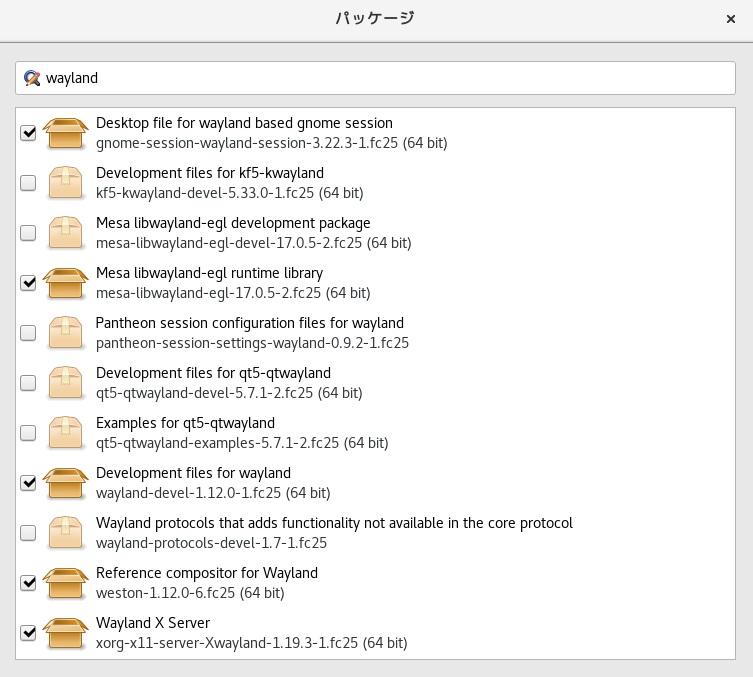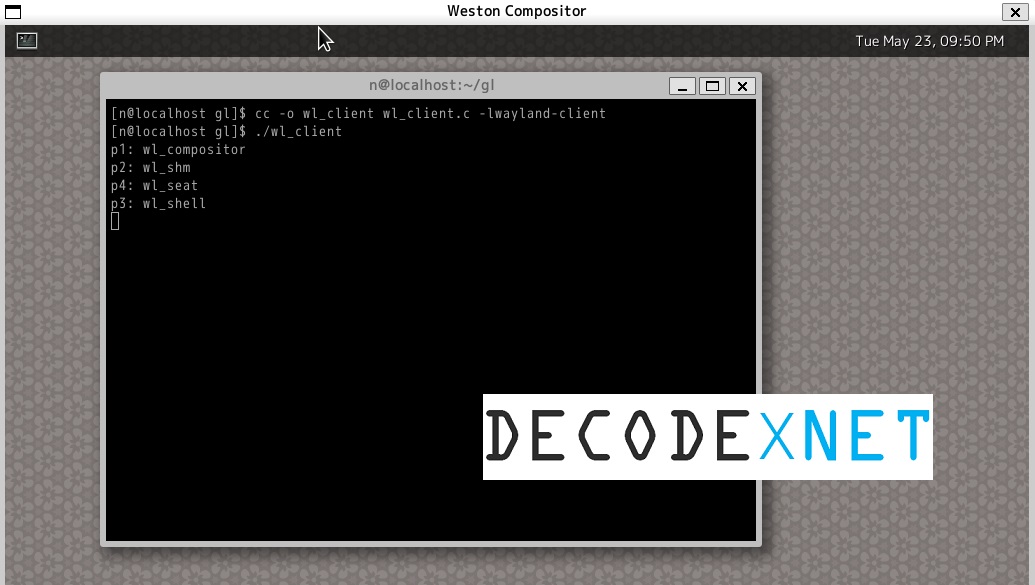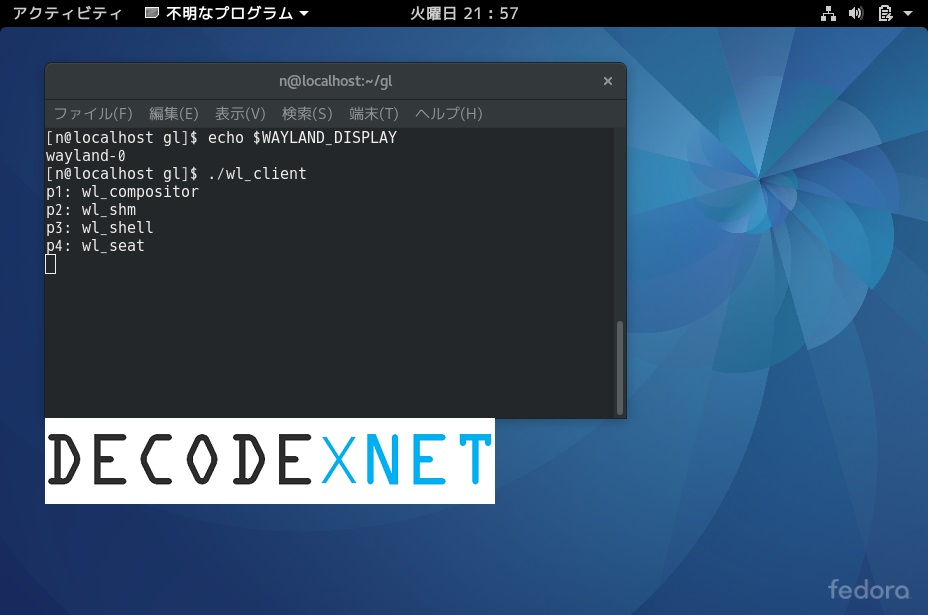Linuxなどで長らく使われてきたGUI環境のXサーバ。このXサーバに変わるものとしてWaylandというものがあるようです。
そもそもGUI画面がなぜサーバなのか、と一番最初は疑問に思いましたが、OSやWindows Managerと切り離せることにより、Windowsとは違って画面デザインが柔軟に変更できるのを見て納得したものでした。
そんなXサーバにかわるWaylandをちょっと試してみました。
環境: Fedora 25

上のように開発用パッケージとWestonコンポジッタを追加します。
参考サイト: https://github.com/hdante/hello_wayland
このサイトにあるソースを表示に関する部分だけを使い、この動作を研究しました。
画像データはこのブログのロゴで、このサイトにあるPythonのツールを使ってファイル変換しました。
|
1 2 3 4 5 6 7 8 9 10 11 12 13 14 15 16 17 18 19 20 21 22 23 24 25 26 27 28 29 30 31 32 33 34 35 36 37 38 39 40 41 42 43 44 45 46 47 48 49 50 51 52 53 54 55 56 57 58 59 60 61 62 63 64 65 66 67 68 69 70 71 72 73 74 75 76 77 78 79 80 81 82 83 84 85 86 87 88 89 90 91 92 93 94 95 96 97 98 99 100 101 102 103 104 105 106 107 108 109 110 111 112 113 114 115 116 117 118 119 120 121 122 123 124 125 126 127 128 129 130 131 132 133 134 135 136 137 138 139 140 141 142 143 144 145 146 147 148 149 150 151 152 153 154 155 156 157 158 159 160 161 162 163 164 165 166 167 168 169 170 171 172 173 174 175 176 177 178 179 180 181 182 183 184 185 186 187 188 189 190 191 192 193 194 195 196 197 198 199 200 201 202 203 204 205 206 207 208 209 210 211 212 213 214 215 216 217 218 219 220 221 222 223 224 225 226 227 228 229 230 231 232 233 234 235 236 237 238 239 |
#include <fcntl.h> #include <stdbool.h> #include <stdio.h> #include <stdlib.h> #include <unistd.h> #include <string.h> #include <sys/mman.h> #include <sys/stat.h> #include <wayland-client.h> typedef uint32_t pixel; #define min(a, b) ((a) < (b) ? (a) : (b)) #define max(a, b) ((a) > (b) ? (a) : (b)) struct wl_compositor *compositor; struct wl_display *display; struct wl_pointer *pointer; struct wl_seat *seat; struct wl_shell *shell; struct wl_shm *shm; struct wl_registry_listener registry_listener; struct wl_pointer_listener pointer_listener; void setup_wayland(void) { struct wl_registry *registry; display = wl_display_connect(NULL); if (display == NULL) { perror("Error : Connecting display"); exit(EXIT_FAILURE); } registry = wl_display_get_registry(display); wl_registry_add_listener(registry, ®istry_listener, NULL); wl_display_roundtrip(display); wl_registry_destroy(registry); } void cleanup_wayland(void) { wl_seat_destroy(seat); wl_shell_destroy(shell); wl_shm_destroy(shm); wl_compositor_destroy(compositor); wl_display_disconnect(display); } void registry_global(void *data, struct wl_registry *registry, uint32_t name, const char *interface, uint32_t version) { if (strcmp(interface, wl_compositor_interface.name) == 0){ compositor = wl_registry_bind(registry, name, &wl_compositor_interface, min(version, 4)); printf("p1: %s\n", interface); } else if (strcmp(interface, wl_shm_interface.name) == 0){ shm = wl_registry_bind(registry, name, &wl_shm_interface, min(version, 1)); printf("p2: %s\n", interface); } else if (strcmp(interface, wl_shell_interface.name) == 0){ shell = wl_registry_bind(registry, name, &wl_shell_interface, min(version, 1)); printf("p3: %s\n", interface); } else if (strcmp(interface, wl_seat_interface.name) == 0) { seat = wl_registry_bind(registry, name, &wl_seat_interface, min(version, 2)); printf("p4: %s\n", interface); } } void registry_global_remove(void *a, struct wl_registry *b, uint32_t c) { } struct wl_registry_listener registry_listener = { .global = registry_global, .global_remove = registry_global_remove }; struct pool_data { int fd; pixel *memory; unsigned capacity; unsigned size; }; struct wl_shm_pool *create_memory_pool(int file) { struct pool_data *data; struct wl_shm_pool *pool; struct stat stat; if (fstat(file, &stat) != 0) return NULL; data = malloc(sizeof(struct pool_data)); if (data == NULL) return NULL; data->capacity = stat.st_size; data->size = 0; data->fd = file; data->memory = mmap(0, data->capacity, PROT_READ, MAP_SHARED, data->fd, 0); if (data->memory == MAP_FAILED) goto cleanup_alloc; pool = wl_shm_create_pool(shm, data->fd, data->capacity); if (pool == NULL) goto cleanup_mmap; wl_shm_pool_set_user_data(pool, data); return pool; cleanup_mmap: munmap(data->memory, data->capacity); cleanup_alloc: free(data); return NULL; } void free_memory_pool(struct wl_shm_pool *pool) { struct pool_data *data; data = wl_shm_pool_get_user_data(pool); wl_shm_pool_destroy(pool); munmap(data->memory, data->capacity); free(data); } uint32_t PIXEL_FORMAT_ID = WL_SHM_FORMAT_ARGB8888; struct wl_buffer *create_buffer(struct wl_shm_pool *pool, unsigned width, unsigned height) { struct pool_data *pool_data; struct wl_buffer *buffer; pool_data = wl_shm_pool_get_user_data(pool); buffer = wl_shm_pool_create_buffer(pool, pool_data->size, width, height, width*sizeof(pixel), PIXEL_FORMAT_ID); if (buffer == NULL) return NULL; pool_data->size += width*height*sizeof(pixel); return buffer; } void shell_surface_ping(void *data, struct wl_shell_surface *shell_surface, uint32_t serial) { wl_shell_surface_pong(shell_surface, serial); } void shell_surface_configure(void *data, struct wl_shell_surface *shell_surface, uint32_t edges, int32_t width, int32_t height) { } struct wl_shell_surface_listener shell_surface_listener = { .ping = shell_surface_ping, .configure = shell_surface_configure, }; struct wl_shell_surface *create_surface(void) { struct wl_surface *surface; struct wl_shell_surface *shell_surface; surface = wl_compositor_create_surface(compositor); if (surface == NULL) return NULL; shell_surface = wl_shell_get_shell_surface(shell, surface); if (shell_surface == NULL) { wl_surface_destroy(surface); return NULL; } wl_shell_surface_add_listener(shell_surface, &shell_surface_listener, 0); wl_shell_surface_set_toplevel(shell_surface); wl_shell_surface_set_user_data(shell_surface, surface); wl_surface_set_user_data(surface, NULL); return shell_surface; } void free_surface(struct wl_shell_surface *shell_surface) { struct wl_surface *surface; surface = wl_shell_surface_get_user_data(shell_surface); wl_shell_surface_destroy(shell_surface); wl_surface_destroy(surface); } void bind_buffer(struct wl_buffer *buffer, struct wl_shell_surface *shell_surface) { struct wl_surface *surface; surface = wl_shell_surface_get_user_data(shell_surface); wl_surface_attach(surface, buffer, 0, 0); wl_surface_commit(surface); } int main(void) { struct wl_buffer *buffer; struct wl_shm_pool *pool; struct wl_shell_surface *surface; int image; setup_wayland(); image = open("decode.bin", O_RDWR); if (image < 0) { perror("Error: Opening surface image"); return EXIT_FAILURE; } pool = create_memory_pool(image); surface = create_surface(); buffer = create_buffer(pool, 450, 86); bind_buffer(buffer, surface); wl_display_dispatch(display); sleep(5); wl_buffer_destroy(buffer); free_surface(surface); free_memory_pool(pool); close(image); cleanup_wayland(); return EXIT_SUCCESS; } |
コンパイル
cc -o wl_client wl_client.c -lwayland-client
westonコマンドで、Westonコンポジッタを立ち上げ、その中のコンソールから実行しました。

Fedora25はデフォルトでWaylandが使われていので、Westonコンポジッタがなくても表示するようです。

これだけのことしかやっていないのですが、コードのボリュームがかなりあります。
初期設定のsetup_wayland関数では、接続処理やリスナーの登録があり、サーバ、クライアント間の通信プログラムらしいです。
registry_global関数では、どのような呼び出し方をされているのか知りたかったので、内容を表示しました。
とりあえず入口にたったところです。
参考: https://fedoraproject.org/wiki/How_to_debug_Wayland_problems
